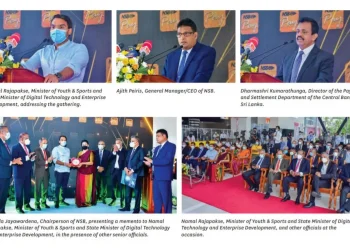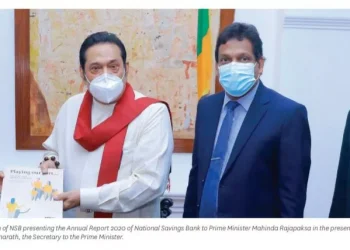Creating a Sri Lanka where every citizen could live freely without fear and mistrust is a mission undertaken by Rear Admiral (Retd) Dr. Sarath Weerasekara, Minister of Public Security. He has identified the critical need to free the country of some of the most notorious criminal activities the underworld and the drug menace and abuse at the top of his list. Modernizing and revamping the Police force to meet the objectives of his Ministry in ensuring law and order in the country is also in progress.
Minister Weerasekara, who had served in the Navy for more than three decades and led the Civilian Defense Force for four years until the war victory in 2009, subsequently entered parliament from the Ampara District, gaining the highest preferential votes in the district. Following the request of President Gotabaya Rajapaksa, he contested Colombo District in 2020. A new electorate, he earned the highest number of preferential votes in the district and the second highest in the country, beating several other senior members and party leaders.
Speaking with Business Today, Minister Weerasekara said that the people in the Colombo District gave their vote to recognize the services he had rendered to the nation. He represented the forces. He also went before the UN Human Rights Council in Geneva to safeguard the interests of soldiers. His patriotism earned him the support of nationalist groups, and, importantly, the vote of the people who love Sri Lanka.
By Jennifer Paldano Goonewardena. Photography Menaka Aravinda.
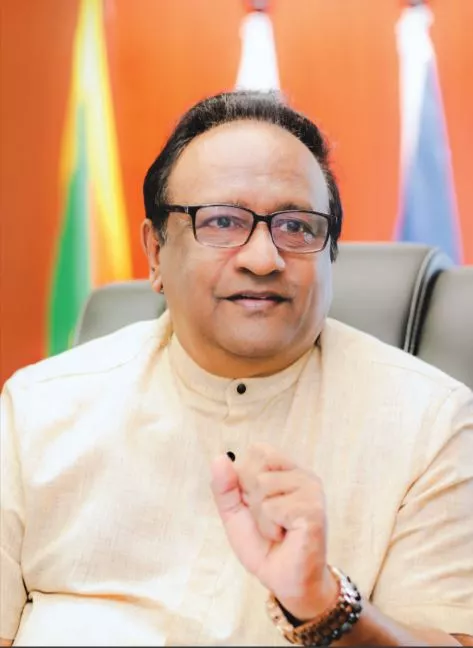
As the Minister of Public Security, what have you planned to improve law and order in Sri Lanka?
President Gotabaya Rajapaksa is very concerned about controlling the drug menace and the vices in the country. And it is for this reason, he established the Ministry of Public Security and appointed me in charge. He has delegated me with the responsibility of improving the service standards of the Police to ensure public security, strengthen the Civil Defense Force to ensure the safety and welfare of rural communities, rid society of the drug menace, and prevent extremism and terrorism. And also control robberies, murders, and crimes, and for women and children to live freely without any fear. Reorganizing and modernizing the Traffic Police using modern technology and directing the Multipurpose Development Task Force for Poverty Alleviation while increasing employment and livelihood and contribution towards low-income families are among other responsibilities under my purview. While those are my core responsibilities, my main concern is dealing with members of the underworld, extortionists, rapists, child abusers, and the drug menace, preventing people from living a life free of fear. The President has given me the responsibility to create a society that is free of fear and suspicion. Such a society is possible only when we successfully eliminate extortionists, the underworld and its activities, rapists, child abusers, drug dealers, and the drug menace.
The conventional Police force is changing. An essential duty of law enforcement is community policing. There are 14,022 Grama Sevaka Divisions, and in each of those, I have almost established a Public Security Committee. The President has recently appointed a young, enthusiastic, and efficient State Minister in Dilum Amunugama to look after this aspect under the Ministry of Public Security.
The public security committees will comprise reputable people in a village, such as retired school principals and religious leaders, and young men and women. We will be appointing two Police officers to each GS division. Therefore, we will be recruiting 28,044 police constables for deployment in the 14,022 GS divisions. To ease the burden on Police stations, those police officers will attend to minor disputes. Police will find it easier if members of the public security committee and the villagers help identify local drug dealers, illicit liquor brewers, those felling trees, and area criminals by cooperating with the Police. Assisting the Police in capturing such individuals will eradicate those activities from their villages. Of course, the names of informants will always be held in confidentiality and rewarded. This committee will not be handling grave crimes.
An individual who requires a Police report for any purpose has to be cleared by the members of this public security committee. The members of this committee will have a degree of authority. They will know individuals in their villages committing minor offenses or when a stranger comes to report to the Police. The Police and the military cannot solely carry out intelligence gathering. Local populations should contribute to this effort. This way, we will control petty crimes. And as we have already executed this process in some villages we are confident that it will be successful. People may already witness the outcome of our work as underworld activities have ceased in 2021. We have captured 526 illegal weapons this year that used to carry out underworld activities, out of which there were 27 T-56 guns. The entire country knows that we are serious and firmly committed to dealing with members of the underworld; we will arrest them and the maximum punishment meted. We are confident that the sentence we enforce on them will prevent such underworld criminals from committing offenses in the future.
Introducing new technology to the Police is the next most important area of change that my Ministry intends to bring about. Conventional methods hitherto being used are fast growing out of practice. We plan to introduce intense CCTV monitoring activities, DNA testing, fingerprinting and alarm systems, and the modernization and digitalization of the Traffic Police.
As a Navy officer who has served for 35 years, followed by another four years with the Civil Defense Force, I know that the famous phrase “Whatever sophisticated equipment we have, it is the man behind the machine that matters” is true. A country may possess the world’s best equipment but do not expect good results if the individual holding the weapon has poor morale. And that’s precisely the reason that our Police force is so stagnant. For example, since 2014, the chief inspectors have not been promoted,which I intend to do, which will result in the appointment of about 230 ASPs in the next few days. Some sergeants have given more than 30 years of service to the Police without a single promotion. They are on the cusp of retiring. Their accommodation and uniform items need improvement. Imagine the plight of a Police officer in the middle of the road, who gets wet in the rain and burnt in the sun, has no access to a washroom, has his meal on time, and lacks decent accommodation, such as single and married quarters. For the Police officer to have good morale, first, his welfare has to be guaranteed.
How do you plan to control the drug menace and other criminal activities taking place in the country?
We are hoping to implement our fight against the country’s drug menace in three stages. We are an island nation, which has its advantages as well as disadvantages. For instance, as the sea surrounds us, drug smugglers can mingle with a fishing boat to smuggle anything through any part of the country. First, we are trying to prevent drugs from reaching the land physically. Most drugs that enter our country are manufactured in Afghanistan and smuggled via Pakistan and Iran in the Indian Ocean. As we know the sea lines of communication, and the routes, even as we speak, the ships of the Sri Lanka Navy are stationed to intercept smugglers’ vessels. Such vessels do not generally travel under a flag, so the Navy stops it whenever there is a suspicious vessel in the sea. Nearly two months ago, the Navy intercepted 100 kilograms of heroin and 100 kilograms of Ice smuggled into the country. So, physically we are doing our utmost to control the movement of drugs from entering the island.
Second, we must try to reduce the demand for drugs. The market is mainly among the young. There are around 10,000 schools in Sri Lanka, national as well as international schools. We will be appointing a committee in every school to educate the children about the drug menace. Most children are unaware of the availability of drugs. According to the law, possessing even five grams of heroin is punishable by death. The parents need to know that and warn their children when sent for parties. A friend can always pass on five grams of heroin, and if caught, a young person can be charged and sentenced to life in prison, which has happened in many instances in Sri Lanka. This school committee will comprise past pupils, students’ parents, student leaders, staff, and children. The Dangerous Drugs Control Board is instructing at least three teachers from every school to detect students addicted to drugs to educate them on the harmful effects of drug use. We also plan to hold seminars in this regard. In reducing the demand for drugs among school children, it is also essential to detect the avenues of access.
The third and most important aspect is that we will not imprison a drug addict from now on. Instead, we will send all addicts for rehabilitation irrespective of social status. Drug addicts commit nearly 40 percent of the crimes. In 2020, there were almost 32,000 prisoners in prisons around the country, of which 11,000 inmates were drug addicts. Addicts are patients who require medical treatment. This way, the congestion in prisons will also ease, and when rehabilitated through a year-long program, these ex-addicts can return to society. In addition, they will receive lessons in meditation and training in a vocation or skill. There will be constant monitoring of individuals following rehabilitation and training. Through the proposed program, we will fully rehabilitate at least 75 percent of the drug addicts. If this program continues, within two to three years, I believe we should see results. We will be very strict with drug dealers and drug traffickers treated as members of the underworld. We are also in the process of studying the people involved in anti-social activities and apprehend them at the right time.
What are other initiatives undertaken by the Ministry of Public Security to ensure national security and stop other criminal activities?
I have an excellent police force. Like in any other institution, there are some corrupt officers in Police, too and I am slowly getting rid of them. But 95 percent of the Police are comprised of good men and women. I have an outstanding secretary, and I am very much satisfied with my IGP.
Also, we have an excellent Special Task Force headed by DIG Waruna Jayasundera, who has received training in the USA. The main task of the STF is to deal with offenses relating to the possession of illegal weapons, drugs, and organized crime. The STF is playing a significant role in this regard. The STF is also responsible for dealing with offenses related to the environment, such as illegal sand mining and illegal soil excavation, illegal clearing of forests, and clearing forest reserves. The President is very concerned about protecting the environment. There is a Drone Division in the STF to detect any illegal activities around river banks and forests. Following the capture of 523 illegal weapons from various parts of the country, which included 27 T-56 guns, there have been no reported incidents related to the underworld in the country. The STF also captured 272 kilograms of heroin and 140 acres of illegal cannabis plantations and 150 detections of illegal sand mining. The STF has been carrying out these operations with the assistance of the Air Force.
While the Navy protects the country from the sea, the country’s internal waterways lack an equal protection force. We are known as the land of tanks with 33 significant rivers flowing to the sea. Most illegal activities take place along river banks. To combat that, I established a Special Water Borne Operation Squadron in May to establish small camps in Colombo, Ambalangoda, Mirissa, Anuradhapura, Trincomalee, Mannar, and Arugam Bay as there are a lot of illicit activities. Illegal brewing and illegal sand mining happen adjacent to river banks. Members of this special squadron will assist in drowning rather than seeking the help of the Navy. The STF divers who are of international standards will be part of this exercise. We hope to buy a sophisticated fleet of boats to conduct operations under this new command. The STF will protect all our internal waterways, rivers, and tanks.
As for monetary provision, I have provided 500 million rupees from the budget allocation for my Ministry to strengthen the SWAT Division of the STF and another 170 million rupees to purchase equipment for this purpose. We have set up sections that can be immediately activated if and when the need arises. We have deployed intelligence sleuths around the country. We are constantly in touch with the ground situation by monitoring CCTV footage and analyzing any likely suspects with STF squads on call to respond to threats immediately. Also, the STF is fully equipped, trained, and motivated to deal with underworld activities taking place deep in the jungle.
How do you hope to set about modernizing the Traffic Police in Sri Lanka?
The proposed solution is to create an intelligent Police force equipped with the latest technology to serve the public with integrity. Sri Lanka has recorded an enormous number of road accidents. In the last ten years, the total number of deaths on the road was 27,000, which is startling given that only 29,000 people got killed during the 30 years of war in the country. From January to now, in 2021, nearly 700 people have died on the road due to accidents. Traffic violations and accidents have been rising even during the pandemic. There have been fatal accidents even during travel restrictions. The reason for this is the lack of road discipline and the lack of preventive punishment. Although the Traffic Police has the equipment to detect individuals driving under the influence of liquor, it does not have the same for drugs. We will be receiving a consignment of drug detection equipment, allowing our officers within 20 minutes to receive a saliva sample to determine whether an individual has been on a drug in the past 72 hours.
We also hope to introduce a demerit system for traffic law violators. Generally, an individual who commits the same offense in different country locations gets away by paying off the fine. The demerit system will result in the cancellation of licenses for repeat offenders. And that is the very reason we want to digitalize the system in the Traffic Police Division. I intend to introduce spot-fines for traffic offenses to ensure convenience. So that an individual from Colombo who commits a traffic offense in Anuradhapura will not have to go there several times. Under the new system, the offender can use the smartphone or the credit card to pay the fine via the spot-fine collection app.
We intend to introduce an app for spot-fines integrated with a demerit point system connected to the Department of Motor Traffic. This way, an individual will not continue violating traffic law because the demerit point scheme integrated into the spot-fine system once it reaches its maximum will lead to either the cancellation or suspension for a few years of the offender’s license. Second, I have initiated dialogue to introduce body-worn cameras as a part of the uniform for on-duty field Police officers. The main operation room will monitor the activities on the body-worn cameras to detect any incidents of bribery. This process will enhance transparency and protect the integrity of the officer and the public.
I will also implement and integrate a secure digital communication system complying with open European standards to interconnect the Colombo City Police in the first phase and allisland Police in the second phase via a grant program. We will install fixed traffic violation cameras for surveillance and monitoring. We will also introduce smart chip points in major cities for law enforcement.
Following the popularity of the 119 Police emergency hotline, I have also introduced 118 to report the five significant crimes of extortion, child abuse, rape, underworld activities, and drug trafficking. We have 44 divisions in the Police with 494 Police stations, and we are hoping to add 197 more to allow easier access to the public. I have given new vehicles to the 44 Police divisions solely to take action against the offenders of those major crimes expeditiously. I will integrate these emergency lines with state-of-the-art single platform command and control systems to match efficiency standards. The Police emergency hotline will be upgraded with features to issue centralized citations; traffic fines sent to violator’s home or registered email address or phone number. These systems will be able to share live information on traffic congestion, suspected criminal and terrorist activities. For instance, a Policeman’s body camera will obtain a suspect’s fingerprint for immediate identification to determine whether they are a suspect wanted by law enforcement.
An e-policing application will be introduced soon to the public to support the Police by informing them about traffic offenders, such as speeding and hit-and-run offenders, by taking a picture and sending it to the Police. The public can support the work of the Police through the digitization process that we have initiated. This app will be given free to the public.
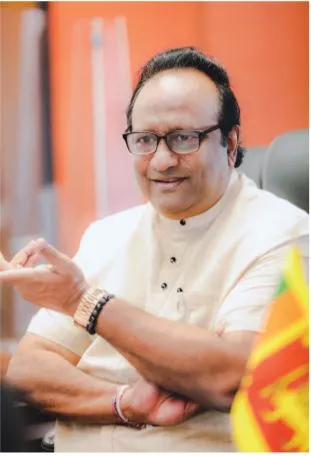
What steps have you taken to nab drivers driving under the influence of liquor and drugs?
Given that this is quite an intense and timely subject, we have held discussions with the National Dangerous Drugs Control Board members and other stakeholders. We have already initiated a pilot project in this regard. We have taken steps to introduce new technology after which the fingerprint can identify caught individuals allegedly driving under the influence of drugs. We have ordered drug detection equipment, which will recognize an individual through a saliva sample, whether they have taken drugs in the past 48 hours.
Do you have a timeframe for the implementation of these plans?
I plan to implement all these proposed changes within a minimum period. There is a Cabinet appointed committee looking after digitalizing the Police, focusing on modernizing the Traffic Police. This Cabinet-approved committee has professionals with experience in all aspects of this process. I have an adviser who is a Telecom and IT specialist. The committee members will produce the Terms of Reference in a week and after which within three months we will order new equipment. Operations will commence after that, and within two years, our plans will be in force. In the meantime, within the next few months, people will see the difference with the introduction of spot fines and body-worn cameras coming into use.
How do you intend to train the Police to adjust to the new working order?
We intend to affiliate the Police Training College to the Kotalawala Defense University. Thereby we will give their training program the recognition of a degree. As of now, we have Police officers with diplomas in Human Resources Management, MBAs, and degrees in criminology, and attorneys-at-law, which they have achieved in their private capacity. With the Police Academy affiliated to the KDU, whatever the courses followed by the Police will be equivalent to a degree given by any other university. That will ensure capacity building and increase professionalism. We can also send officers for overseas training or invite trainers from abroad to develop them further.
Given your experience, what are the best practices you would want to bring to our Police force and among the public from other countries?
In other countries, discipline is the most important trait among the Police and the armed forces. A disciplined Police force will garner the respect of the public. However, it is a two-way relationship where there is mutual respect between the officer and the public. The Prime Minister of New Zealand was able to control the spread of COVID in her country because her people listened to her and followed instructions. However, most of our people, unfortunately, are lacking in discipline. And that is precisely the reason that I am a proponent of military training for youth over the age of 18 years. I received criticism for proposing it in the first place. Military training is not to transform an individual into a soldier.
The purpose of the military training that I propose is to instill a love for the country, its resources, and its culture. To instill patience, learn to respect each other, be aware of the law of the land, and the punishment for breaking the law. In Singapore and Thailand and even in the US, they have military training; but it is not to train an individual to be soldier. It is to instill essential traits of patience and discipline. In Thailand, for instance, when two cars are involved in an accident, the two drivers greet each other, and they resolve the issue through their respective insurance agents. Compare this with the same scenario in Sri Lanka. There is so much arguing and fighting. There is voluntary Bhikkhu ordination for limited periods in Thailand, which trains an individual to achieve calmness.
As military camps have all the facilities, we can easily give this training. Also, an environment inside a base is conducive to a type of training to instill discipline. Lack of discipline and love for the country is the primary cause of many issues. Look at the colossal damage done to the environment by deforestation, illegal sand mining, and gem mining, which people carry out thoughtlessly. They carry out these illicit activities because they are not concerned about their country and the future generation.
We must love Sri Lanka. An individual begins to love their country when there is an awareness of its history. And it is in this awareness that one will want to safeguard the country at all cost. To love Sri Lanka, an individual should know its history of 2,500 years and how our ancestors protected it against numerous invasions and the people who died in pursuit of that freedom. The Portuguese were in Sri Lanka for 148 years, since invading parts of Sri Lanka in 1505. The Portuguese were in Brazil as well, but only for 20 years. Although Brazil is 70 times larger than Sri Lanka, every Brazilian speaks Portuguese. But despite dominating Sri Lanka for 148 years and being so much smaller than Brazil, we do not have a single citizen who speaks Portuguese. It is because our ancestors did not allow its influence in the country. The Dutch followed this.
What did the English do in 1818? Robert Brownrigg gave orders to kill every male between 18 to 35 years in the Uva-Wellassa battle. The British killed all the cattle, destroyed the tanks and the paddy fields, cut down the island’s fruit trees, and poisoned all the drinking wells to control the natives. Today those are the very people trying to teach us about human rights violations in Geneva. This part of our history that Sri Lankans should be aware of to be stirred by a desire to protect it.
A disciplined society will take pride in its country. So, the entire country must band together to bring this change. Every citizen must deny extremism and terrorism and embrace patriotism. There must be one country and one law. And that’s the reason for my opposition to provincial councils because apart from India forcing it upon us, it can have nine different laws for the same subject in nine provinces. Our ancestors, throughout history, have sacrificed their lives to maintain the unitary nature of the country. All patriots must follow suit.
We should nurture our younger generation into patriots. For that, they must learn history and go through compulsory military-style training. My next Cabinet Paper will be a proposal to introduce mandatory military training for youth over 18 years to create patriotic citizens in the future. I do not know whether I will succeed in getting my proposal approved. However, I will pursue it.
You have worked with the current leadership, especially with the President and the Prime Minister, while serving in the forces. What is the experience working with them in your present capacity, and what kind of support do you receive from them?
I am very grateful to the President for recommending me in 2006 as I was on the cusp of retiring from the Navy as the Chief of Staff in the position of Rear Admiral to then-President Mahinda Rajapaksa to be given in charge of the Civil Defense Force. I had the task of reorganizing the Home Guard Force. There were around 19,000 serving in it when I took over, which I raised to 42,000. I replaced their 12-bore weapons with T-56 guns. I provided them with special operations training in commando warfare, including skills in night fighting. And together, I managed to protect all the threatened villages from LTTE attacks. We also managed to follow and eliminate any infiltrators into the border villages. All this was possible because I reorganized the CDF into a stronger outfit. I am very grateful to the President because I would not be in this position if not for him. He allowed me to shine. If not for him, I would have been just another retired Admiral by now.
Just before the end of the war, I succeeded in elevating the standard of the CDF to the level of other forces. When the Government immediately required 3,500 personnel to the Army to protect the supply routes and forward defense lines, the CDF provided personnel for this purpose within three days while safeguarding the threatened villages. And this role paved the way for the Army to move forward. In the absence of CDF personnel, the Army would have had to deploy an extra 42,000 troops for this purpose alone. At the end of the war, as the DG of CDF, I was among five officers from the Army, Navy, Air Force, and the Police, felicitated by the Government in contributing to the war victory.
It was Gotabaya Rajapaksa and Mahinda Rajapaksa who wanted me to contest from the Ampara District initially. I topped the highest number of preferential votes in the Ampara District and was appointed Deputy Minister of Labor. This time, it was Gotabaya Rajapaksa who insisted that I contested from the Colombo District. I thank Mr. Basil Rajapaksa, too, for his correct advice in that regard and for giving me the nomination. I was first reluctant as I had not worked for the people of Colombo. However, I received 328,000 votes being a first-timer, emerging first in Colombo and second in the island. My victory was possible because I believe that the people in the Colombo District gave their vote to recognize the services I had rendered to the nation. I represented the forces, and I also went before the UN Human Rights Council in Geneva to safeguard the interests of our soldiers against the false charge of war crimes. The last government treacherously accepted that we committed war crimes and paved the way for our soldiers’ prosecution before the International Criminal Court.
With the least amount of campaign funding, I succeeded in Colombo because the people knew that it was the President’s wish that I contested from Colombo. And my campaign reflected the respect I have for President Gotabaya Rajapaksa because unless for his backing, I may not have been able to secure such a large number of preferential votes. It was mainly my service to the country that propelled me to first place in Colombo. My nationalistic ideals saw many other nationalists and Buddhist monks backing me, witnessing how I defended the war heroes nationally and internationally.
What prompted you to go before the UN Human Rights Council in Geneva while it was in session in 2017?
We were the only Army in the world that won the war by rescuing 295,000 people, which was the largest rescue operation recorded in the world. However, they were accusing us of war crimes. The irony is that the six globally recognized experts on war crimes, Desmond de Silva, Sir Geoffrey Nice, Professor David M Crane, Professor Michael Newton, Major General John Holmes, and Rodney Dixon, QC, who were members of the Paranagama Commission, or the Presidential Commission to Investigate Complaints Regarding Missing Persons clearly said that we had not committed any pogrom. There is a difference between a crime and a war crime. One individual or several individuals can commit a crime.
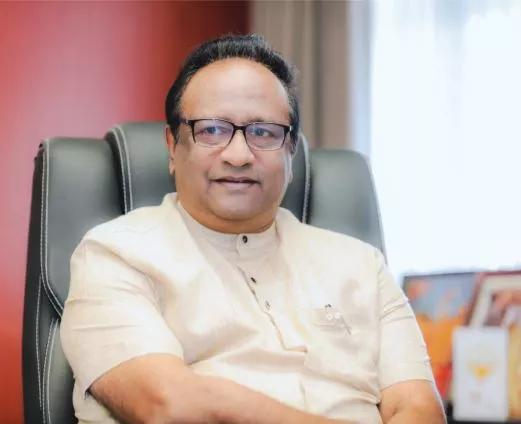
In contrast, a war crime is an organized pogrom and committed under a superior’s command, such as the massacre of people in a village or shelling a hospital, or preventing aid from reaching civilian areas. Those who committed crimes during the war had been court marshaled or jailed. But as a government, none of our forces ever committed war crimes. One of the major offenses that they alleged we had committed was preventing aid from reaching the North, which was a deliberate attempt at starving the people. That was a wrong accusation.
President Gotabaya Rajapaksa, as the Secretary of Defense, had formed a consultative committee on humanitarian assistance, which he chaired most of the time, which also included ministry secretaries and representatives of all the UN agencies in the country. These members will attest to the number of ships we sent to the North. We sent shiploads of food well aware that those items would fall into the hands of the LTTE. We also paid government workers in the North fully aware that they were working for the LTTE. We were the only Army that fought the enemy, fed the enemy, and sent medicine to the enemy to treat their wounds. Neil Buhne, the UN resident coordinator in Sri Lanka, said that the efforts taken by the government in sending goods to the North should receive the gold medal for being a role model. Ameen Avad, the UN resident coordinator for refugees, said that we were a role model for the entire world.
Imelda Sukumaran, the GA of Mullaitivu, said that they had a stock of food for three months at any given time. With all this evidence, the last government accepted that we had deliberately prevented aid from going to the North, and consequently, charged with committing a war crime. My trip to Geneva was in opposition to the then government’s stand in defending our soldiers. I met the UN Human Rights Council’s Secretary-General with reports and evidence and a rebuttal to the eight charges against us. With the support, I received from many nationalist movements in Sri Lanka, the Global Sri Lankan Forum, and patriots overseas, I fulfilled that undertaking. I believe the people of Colombo appreciated my role in Geneva, in addition to my vote against the 19th Amendment. I think the people voted for me not based on any support given to people at an individual level but for my service to the nation. If I am alive by the time of the next election and in a position to contest, I think the people will vote me back to parliament, especially if I succeed in improving the Police force and create a society in which people can live without fear and doubt.
What was the rationale upon which you placed your vote against the 19th Amendment?
I was waging a lone battle in parliament against the 19th Amendment. I believe that the 19th Amendment ruined the country. I was against the Constitutional Council introduced under the 19th Amendment, which comprised nine people. The Prime Minister and the Leader of the Opposition appointed five members to the constitutional council. The President appoints one person, and the members of the minor parties appoint one. Hence, of the nine members of the Constitutional Council, the majority, that is, seven appointments were in the hands of the Prime Minister and the Leader of the Opposition. Then what becomes of the President? The President is an individual appointed by the entire country. The 19th Amendment had delegated the President’s power to two people, the Prime Minister and the Leader of the Opposition, who represented two districts. What happened after? Ranil Wickremasinghe was appointed Prime Minister while R Sampanthan became the Leader of the Opposition. Together they had the power to appoint the IGP and the Chief Justice and other judges to the Court of Appeal and the Supreme Court, and all independent commissions. So through the 19th Amendment, parliament handed over the people’s right to choose with Ranil Wickremasinghe from the Colombo District and R Sampanthan representing the Trincomalee District. That was not fair. I believe it is the prerogative of the Executive President to take decisions concerning necessary appointments to state institutions and the judiciary because he wields the power of the people, and he must do the right thing on behalf of his people. According to the constitution, the President is responsible for the country’s security and law and order. The Police are responsible for ensuring law and order in the country, but the President under the 19th Amendment did not have the power to appoint the IGP of the country. That was totally against the constitution of Sri Lanka.
Since you spoke so much about the people’s role in the country’s betterment, what do you envisage someday?
I dream of a disciplined society. Sri Lanka cannot become a better country with the kind of attitude that the people have right now. I do not think the habit of opposing everything is good or the right thing to do. Even when there is something positive, people still oppose it for the sake of doing so. We can take a cue from India, where the government and the opposition hold the same view on the Kashmir issue. But this does not happen in Sri Lanka, which needs to change. Moreover, our politicians are themselves not adequately patriotic. We need leaders who love their people and the resources of the country.
We have every reason to protect and treasure this country. We are in a very strategic position in the Indian Ocean. On the west, 2,000 kilometers away is the Straits of Hormuz; and another 2,000 kilometers on the east is the Straits of Malacca. Not a single vessel could enter the Indian Ocean if these two strategic points are blocked. In the south, there is no single country for a long distance. And hence we are in a critical location, for thousands of years attracting invaders who have wanted to occupy us. Winds that blow across Antarctica enter from the Southern port of Galle as the southwest monsoon. We have abundant monsoons, enough for its people, fauna, flora, and wildlife. Rumassala and Sigiriya are wonders. And that is why Arthur C Clarke chose to live in Sri Lanka until his death and desiring to be born again in Sri Lanka. We are the island of gems, and we have only mined 10 percent of its entirety in this land. We have enough natural resources to develop this country, including platinum, nickel, and gold. We have gas and oil as well. We have acquired 200 miles of the economic zone. Anything planted on this land grows because we have an abundance of water.
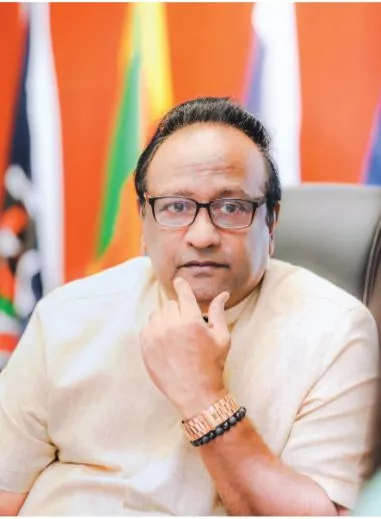
With such abundance, all that we need is a patriotic people. Because we had patriotic people in the past, we could elevate the country to the superior position of the Pearl of the Indian Ocean. The Giant Canal that is 57 miles long, with an inclination of six inches per mile, shows that the builder had to be an expert in trigonometry. And it is incredible to know that 2,000 years ago, this country had experts in trigonometry. When the Canadian engineers pinpointed for constructing the sluice gate for the Maduru Oya reservoir project exposed upon excavation the ancient Bisokotuwa or the cistern sluice, it was a technology our ancestors possessed 2,000 years ago. Walk three feet away from the basal rings circling the Ruwan Weli Seya to see the Chuda Manikkya at the top of the stupa at the same angle uninterrupted allaround the globule. To build a structure with such symmetry, the builder had to be an expert in geometry. At 600 feet, there were swimming pools atop the Sigiriya Rock. The engineers had used surface tension force to draw water to the top, a marvel found nowhere else in the world, making it the world’s eighth wonder. Aren’t we proud of that history? This type of knowledge inspires us. However, everything identified with Sri Lanka’s indigenousness will survive only if its people strive to preserve their language. Only then will the nation foster and prosper. I believe the individual who loves their mother tongue is a true patriot. We can make English compulsory, but we should give our mother tongue the primary place.
I have sacrificed my life for Sri Lanka. Today, my wife is living with dementia. I was hardly at home during my 35 years of service with the Navy and the next four years fighting the war with the CDF protecting the threatened villages from LTTE attacks. She raised my two children to make my son a doctor and my daughter a speech pathologist. Later as Member of Parliament for Ampara, I was busy looking after the welfare of the people there. Even today, as the Minister of Public Security, I am rarely at home. My daughter texted me, writing, “Thaththa, we love you so much, but what happens ultimately is that we are left with a patriotic father and a sick mother.” And this is how much I have sacrificed for Sri Lanka. However, some people are quick to accuse us when we have not done anything wrong.


